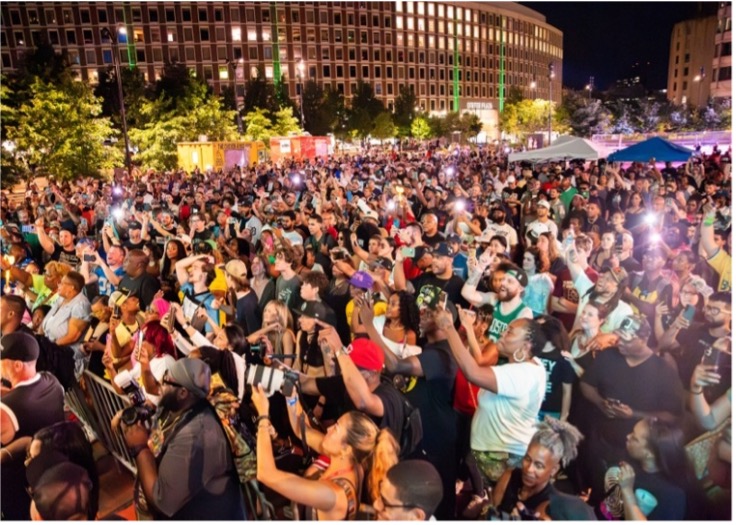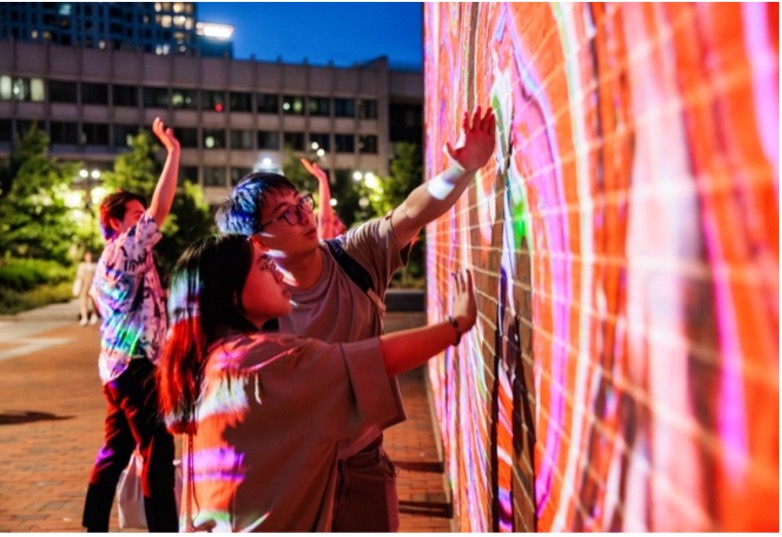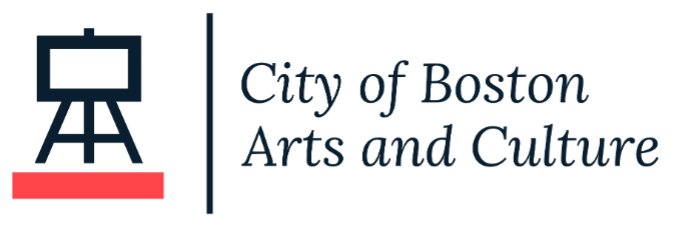Organization
The City of Boston, Mayor’s Office of Arts and Culture (MOAC) envisions a vibrant and creative Boston, where everyone can access and participate in the arts. The City partners with the local cultural ecosystem to support the creative economy, integrate public art into neighborhoods, and increase accessible opportunities for creative expression. Advocating for investment in creativity will lead to a reimagined, more just Boston where MOAC’s multifaceted impacts will be seen and felt throughout the City. Key areas of work will also include support to the cultural sector through grants and programs, advancement of new and improved cultural facilities and artist workspaces, and the commissioning, review, and care of art in public places, among other visionary initiatives.

Under Mayor Michelle Wu, MOAC has embraced a transformative vision for the arts and gained considerable national attention for equitable and inclusive grantmaking, ecosystem development, and support for creative initiatives throughout the City. Over the past three years, MOAC has launched signature efforts including leveraging $25 million in grantmaking of American Rescue Plan Act resources to Boston-based artists, organizations, and events, as well as launching new transformative initiatives including Boston Family Days and Un-Monument, both supported by public-private partnerships. These city-wide efforts have substantially elevated public perception of the importance of the arts in daily life and exemplify the Mayor's commitment to the importance of the arts and creativity in the social, educational, and economic impacts on the quality of life in Boston.
MOAC also facilitates a number of robust public grant opportunities including the Boston Cultural Council Organizational grants, as well as grants for individual artists, events and activations, public art, artist housing certifications, and more. Over the past four years, the MOAC has elevated Boston's reputation as a leader in equitable, inclusive arts initiatives through transformative programs and strategic grantmaking funded by American Rescue Plan Act resources.
The Chief of Arts and Culture reports to the Mayor of the City of Boston and serves as a member of the Mayor’s Cabinet. The Chief of Arts and Culture oversees approximately 25 full-time staff with nine direct reports and teams, including administration and finance, cultural planning, public art, communications, grants and programs, transformation, transformative art and monuments, City Hall Plaza engagement, and Strand Theatre. For the fiscal year ending June 30, 2025, MOAC anticipates an operating budget of $4,611,840, and the fiscal year 2026 has a combined annual budget of approximately $8 million including operating funds, capital funding, and external funds.
Community
Home to more than 700,000, and situated in a metro region with more than 4.9 million people, the City of Boston is a center for innovation and entrepreneurship as well as for social and political change. Boston has become the economic engine and cultural hub of New England. The City is young and diverse, with a majority of residents being non-white. The City is home to more than 30 institutions of higher education, from MassArt, the nation’s first and only independent public college of art and design, to Emerson College and Boston University. More than 200,000 students call the area home.

Boston is home to a vital and diverse arts and cultural sector with world-renowned museums, orchestras, performing arts organizations, historic sites, regional cultural centers, emerging and experimental performing and visual arts entities, and multi-disciplinary cultural heritage organizations. Individual artists and creatives from all disciplines and genres are active contributors to the region. The region is also recognized for the strength and international reach of its education, health, and technology sectors. The area attracts dedicated faculty and ambitious students who choose to study in one of its many outstanding higher educational institutions.
Sources: censusreporter.org; pluralism.org; visitboston.org
Position Summary
The Chief of Arts and Culture (Chief) of MOAC will be a visionary, collaborative, and dynamic leader responsible for shaping and championing the City's cultural identity while supporting the vibrant and diverse arts ecosystem. They will spearhead the Mayor’s agenda on the creative economy through the leadership of the Arts and Culture Cabinet. The Chief of MOAC serves the City, the Mayor, citizens, and visitors in leading the development and implementation of cultural policy in partnership with the local creative ecosystem, other City Chiefs and departments, and other public and private regional partners. This role offers the opportunity to lead in a city poised to reimagine its cultural identity and to make a lasting impact on its creative landscape. The next Chief of MOAC will inherit a legacy of accomplishments and will have the opportunity to help the City address new and emerging priorities.
Role and Responsibilities
Visionary and Strategic Leadership
- Set the direction for MOAC while reimagining Boston's cultural narrative and championing efforts to develop career pathways to develop Boston’s future creative workforce and revitalize downtown Boston as a creative enterprise zone and hub for the regional creative economy.
- Serve as the primary advocate for the arts within city government, foster cross-departmental partnerships, and be a responsive interagency partner for all mayoral initiatives.
- Foster innovative collaborations with private, public, and university sectors to secure resources that elevate the creative sector in Boston, leverage existing partnerships, and explore innovative funding strategies to accelerate momentum.
- Lead national engagement and efforts to position Boston as a beacon of creative and artistic innovation, uplifting Boston’s creative assets and industries, including healthcare, education, and real estate.
- Articulate the strategic vision for Boston’s arts and cultural priorities and align with the Mayor’s vision of a vibrant, inclusive City, that works across the various Cabinet departments.
- Embrace other visionary and strategic leadership duties, as needed.
Impactful Engagement and Relationship Building
- Cultivate and sustain relationships with many different types of stakeholders throughout the creative economy, community groups, philanthropic organizations, and corporate partners to secure funding and resources while building a shared collaborative approach to sector development across the varied arts and culture organizations in the City.
- Address major challenges, such as a lack of affordable space for creative artists and organizations, with an ongoing effort to prevent the displacement of visual and performing artists supported by sustainable funding that fosters a conducive environment for creatives at all levels.
- Serve as a leader and resource to facilitate the advancement of the Boston creative sector in navigating its evolution to best address challenges that include fair wages, fluctuating audience engagement, and innovative business models for cultural organizations.
- Represent the City on intergovernmental boards and committees that advance its interests, including those with regional and national networks, through conversations with the national arts commissioners network, creative state agency network, and various cultural policy conversations.
- Communicate effectively with diverse stakeholders, amplifying Boston’s cultural achievements on the local, national, and international levels.
- Embrace other impactful engagement and relationship building duties, as needed.
Financial and Operational Oversight
- Oversee Cabinet administrative functions, including annual budgeting and financial administration; human resources, recruiting, and organizational alignment; performance management; and organizational improvement.
- Supervise, guide, mentor, and inspire a highly visible and professional staff.
- Empower and expand MOAC programs, including cultural planning, grant making, public art initiatives, creative workforce development, and cultural equity, among other new efforts and initiatives.
- Advance equity and accessibility, building on MOAC’s successful grantmaking practices which ensure that marginalized communities continue to see themselves represented in Boston’s cultural landscape.
- Embrace other financial and operational oversight duties, as needed.
Traits and Characteristics
The Chief of MOAC will be an inspiring and collaborative leader who demonstrates a staunch commitment to and outcomes for the arts and creative sectors. They will be receptive to new ideas and approaches that may emanate from all sectors of the City and the community that MOAC services. The Chief of MOAC will embody an altruistic yet resourceful approach with an instinctive nature to expand the concentric circles of influence where authentic communications and trust are deeply respected and valued. They will be inherently people oriented and accept a highly visible advocacy role with considerable levels of interactions with passionate and committed stakeholders. The Chief of MOAC will exhibit considerable futuristic thinking during a time of unique societal challenges that are simultaneously volatile, uncertain, complex, and ambiguous. Extensive capacity for resiliency and flexibility will be needed to easily shift between multiple conversations and initiatives that will have positive impacts throughout the diverse communities served by the City. The MOAC Chief will be a strategic thinker with a proven track record of leading and operationalizing complex initiatives as well as inspiring change.
Other key competencies include:
- Influencing Others and Diplomacy – The capacity to convene numerous stakeholders to best anticipate, meet, and exceed their needs while listening carefully and respectfully, building rapport, communicating transparently, and relating well to an array of unique constituencies, both internally and externally.
- Futuristic Thought and Action – The ingenuity to think and act with entrepreneurial zeal while navigating the intricacies of opportunities within government agencies, systems, and policies that advance short- and long-term beneficial outcomes.
- Negotiation, Conflict Resolution, and Flexibility – The dexterity to inspire, build trust, confer, and lead with confidence while collaborating with others to identify challenges, overcome hurdles, set objectives, and reach shared goals that have positive impacts on the City and throughout the arts ecosystem.
- Time and Priority Management – The clarity to prioritize, manage, monitor, and complete multiple complex tasks, mobilize wide-ranging resources, and deliver measurable outcomes within allotted time frames.
Qualifications
At least 10 years of full-time, relevant professional experience in a supervisory capacity is required. A proven track record of coordination and leadership across similarly complex government agencies, universities, or nonprofit organizations in or related to the arts and creative industries is a must. An ability to foster partnerships across sectors that effectively advance the arts is expected. Outstanding communication and advocacy skills with the ability to engage and inspire diverse communities is essential. A cultural fluency in and deep knowledge of arts ecosystems, including their unique challenges and opportunities, is expected. Results in securing public and private funding while managing resources to support large-scale programs are needed. Experience with government operations and processes in a political environment is strongly preferred but not required. City of Boston residency is required within six months of offer acceptance.
Compensation and Benefits
The City of Boston provides a competitive and equitable compensation package with an estimated salary of at least $165,000. A comprehensive benefits package includes paid time off and holidays; health, medical, dental, vision, and prescription drug insurances; long-term disability, and life insurances; and a defined contribution retirement plan, among others. Full benefits can be reviewed on the City of Boston website here.
Applications and Inquiries
To submit a cover letter and resume with a summary of demonstrable accomplishments, please click here or visit artsconsulting.com/opensearches. For questions or general inquiries about this job opportunity, please contact:
Bruce D. Thibodeau, President
Josyanne Roche, Vice President

292 Newbury Street, Suite 315
Boston, MA 02115-2801
Tel (888) 234.4236 Ext. 201 (Thibodeau) or Ext. 245 (Roche)
Email MOAC@ArtsConsulting.com
The City of Boston is proud to be an Equal Opportunity Employer. We are committed to creating a diverse and inclusive environment. Therefore, qualified applicants will be considered regardless of their sex, race, age, religion, color, national origin, ancestry, physical or mental disability, genetic information, marital status, sexual orientation, gender identity, gender expression, military and veteran status, or other protected category.
The City of Boston is located on the traditional homeland of the Massachusett people and the neighboring Wampanoag and Nipmuc peoples. We acknowledge the atrocities committed against Indigenous peoples, all of the communities that have been subsequently harmed, and the ways in which colonialism has created systemic oppression. We recognize the continuing presence of these communities and the Indigenous peoples represented in the City’s residents in addition to those in the diaspora. We also recognize that Boston exists as a result of the forced labor and economic extraction from enslaved African Americans.
Click here for the downloadable PDF.

